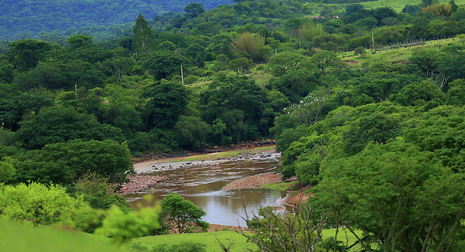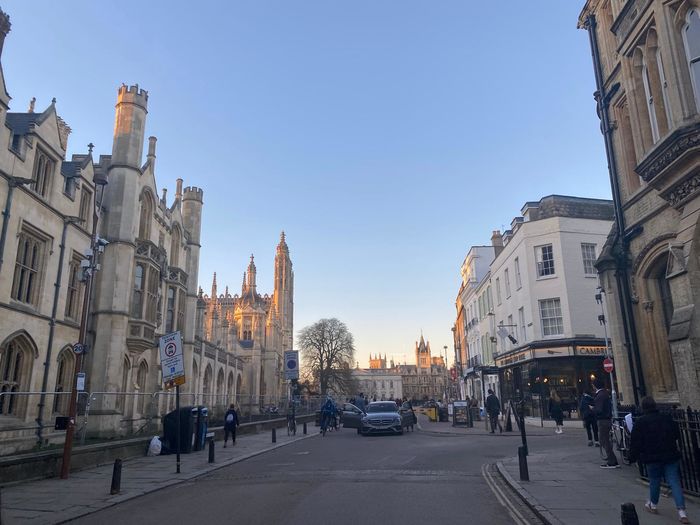Documenting the resistance of the people of Urukurenda
Owen McGovern reflects on the screening of Dr. Penelope Anthias’s Urukurenda: In Search of the Land Without Evil

Since 2015, the Bolivian government has permitted oil and gas extraction in protected areas – including the Tariquía Reserve, which partially overlaps with Urukurenda, an indigenous community in southeastern Bolivia fighting a legal battle in the face of accelerating hydrocarbon extraction in their region. Urukurenda’s right to a prior consultation with the oil company has been consistently denied by the government, paving the way for extraction to take place, a situation that prompted community leader Maximiliano Queso to claim that “the authorities don’t listen to us”.
A few weeks ago, I was lucky enough to attend a screening of the documentary Urukurenda: In Search of the Land Without Evil, directed by Dr. Penelope Anthias, at the Cambridge Centre for Latin American Studies (CLAS). The documentary focuses on the struggle of Urukurenda. Cambridge has hosted various projects with a similar focus on Latin American environmental politics, including Prof. Mark Goodale’s seminar on lithium extraction in Bolivia and Priscila Tapajowara’s short film depicting the impact of modern transportation on Amazonian indigenous communities.
“The documentary Urukurenda takes pains to redress this imbalance by putting these voices at the forefront of its narrative”
The documentary Urukurenda takes pains to redress this imbalance by putting these voices at the forefront of its narrative, clearly concerned with this silencing of indigenous voices by both the state and corporations. The film is almost entirely composed of the people of Urukurenda telling their personal and collective stories in their own words and language.
Although most of those interviewed for the documentary chose to speak Spanish and are subtitled in English, one man briefly speaks in Guaraní. At this moment, the subtitles disappear, and for the spectator it is disarming to lose the privilege of understanding (albeit briefly, as an explanation in Spanish is soon offered). Despite later learning that this was simply due to a lack of a Guaraní translator, this moment is still significant in capturing the attention of the viewer, encouraging them to focus on the tone and emotion of the speaker, rather than solely on the subtitles.
The documentary’s redistribution of narrative power is also apparent in the (lack of) depiction of the filmmakers themselves. Rather than acting as authoritative voices that reduce marginalized groups to passivity, Urukurenda’s filmmakers are almost entirely absent from it, leaving the discourse to be shaped by the indigenous community members themselves. The only time the documentary does call attention to its creators is to differentiate them from the people of Urukurenda. When depicting the filmmakers’ arrival into Urukurenda, the formerly static camera becomes shaky, and the sounds of nature are drowned out by Warpaint’s 2010 single ‘Undertow’. This is an incursion, although not a hostile one, onto the land and story of Urukurenda; by highlighting the separation between the filmmakers and the indigenous community, the documentary ensures that protagonism remains with Urukurenda.
“Aside from voice, Urukurenda also suggests that the act of ‘mapping’ is crucial in both furthering and fighting marginalization”
By inserting an advertisement for the oil extraction in Tariquía, the documentary is able to contrast the corporation’s artificial discourse of “extraction as progress” with the personal testimonies of the people of Urukurenda. Such strategies are common in the postcolonial documentary; Javier Fernández Vázquez’s Anunciaron tormenta (2020), which deals with Equatorial Guinea’s colonial past and present, similarly elevates marginalized voices and downplays the authority of Western discourse.
Aside from voice, Urukurenda also suggests that the act of ‘mapping’ is crucial in both furthering and fighting marginalization. For example, Maximiliano Queso reveals in the documentary that manipulation of the Tariquía Reserve’s borders has allowed oil and gas extraction to take place in the area, demonstrating how ‘re-mapping’ backed by state authority can serve extractive purposes.
Meanwhile, a sequence of maps showing the personal journeys taken by several of the residents shows how they often transcend provincial borders, putting them on geographical as well as societal margins. Urukurenda’s founder, Dino Ortiz, explains that “the Guaraní people have no limits nor borders. Go where we may, we are the same”. The corporation’s conception of borders and maps as tools of authority and control, is at odds with the indigenous view that prioritizes the connection between the land and collective identity. Ortiz later encapsulates this more human connection with the land: “Ĩvĩ Maraëĩ tells us that we need to find the Land Without Evil, to work and leave it for our children, grandchildren, and great-grandchildren”. By redistributing discursive power, Urukurenda allows a marginalized community to challenge the commodification of land and propose an alternative conception based on the conservation of and coexistence with nature.
The documentary will be available to view on Dr. Anthias’ website and YouTube channel in the coming weeks. Special thanks to Dr. Anthias for her assistance in writing this article, and to Prof. Sarah Radcliffe for chairing the CLAS screening of the film.
 News / Cambridge academics sign open letter criticising research funding changes22 February 2026
News / Cambridge academics sign open letter criticising research funding changes22 February 2026 News / University Council rescinds University Centre membership20 February 2026
News / University Council rescinds University Centre membership20 February 2026 News / Supporters protest potential vet school closure22 February 2026
News / Supporters protest potential vet school closure22 February 2026 News / Hundreds of Cambridge academics demand vote on fate of vet course20 February 2026
News / Hundreds of Cambridge academics demand vote on fate of vet course20 February 2026 Comment / A tongue-in-cheek petition for gowned exams at Cambridge 21 February 2026
Comment / A tongue-in-cheek petition for gowned exams at Cambridge 21 February 2026








